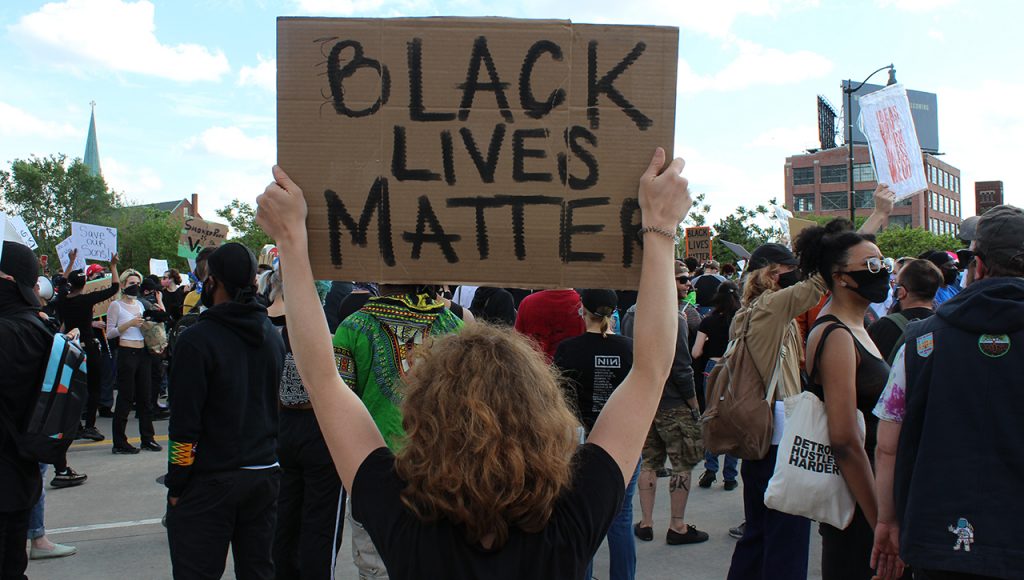Racial Trauma Makes Derek Chauvin Trial Too Hard for Some To Watch
If you haven’t been able to watch the Chauvin trial, you’re not alone. But talking about the case and what it represents is crucial in this moment.

A short essay on the Chauvin trial by Stephen Henderson read at the start of Detroit Today:
We are going to spend the hour today talking about the Derek Chauvin trial. This is a subject that has been really difficult for me to think or talk about for so many reasons … I’m keeping up with the trial, because, well, that’s part of my job. I read every day about what happens in the courtroom, and the trajectory of the arguments being made. But so far at least, I have found it impossible to actually watch the trial — to listen to the testimony that’s being given, or see the images that are being shown to jurors.
It’s just too much, emotionally. Similarly, I have never watched the full video of Derek Chauvin kneeling across George Floyd’s neck for more than 7 minutes, choking the very life out of him. That’s too much, too.
When I think about it, it’s too easy to imagine myself, or my son, or anyone else I know, in the same situation. It’s too easy to let the anger and, yes, hatred, rise in me toward Derek Chauvin.
And so — I’ve been practicing careful avoidance. Never clicking on the channels that are showing the trial, and even avoiding television news reports that replay snippets of courtroom testimony.
I am boycotting, in a sense.
But I still believe it’s important for us to be talking about this on this show. And it’s important to invite our listeners into a conversation about all of the dynamics on display in Minneapolis.
Listen: Stephen Henderson, former U.S. Attorney for the Eastern District of Michigan Barb McQuade and CNN’s Nia-Malika Henderson talk about the Derek Chauvin trial from procedural and cultural perspectives.
Guests
Barb McQuade is a professor at the University of Michigan Law School and a former U.S. Attorney for the Eastern District of Michigan. On the difficulty of watching the trial, McQuade says that she thinks “anyone who is human would find this difficult to watch. It’s been interesting though, I feel like the prosecution has a very compelling case here.”
On the way that bystander witnesses are being incorporated into the trial, McQuade says that it’s a noteworthy distinction when comparing this case’s procedural elements compared to other trials in the past. “Any effort to portray [the witnesses] as an angry mob has really fallen flat,” she says.
As far as the role of the video, McQuade says that it “really holds officers accountable because jurors can see for themselves.” She adds that “the video is not only helpful for bolstering witness testimony but really holds officers accountable. The horror of what happened is magnified when people can see it.”
Nia-Malika Henderson is a senior political reporter for CNN. She recently wrote an op-ed titled, “Why I can’t watch the Derek Chauvin trial.” Henderson says she has tried to limit her exposure to the trial, but that it is difficult in her role as a journalist.
“I have to in some ways go to great lengths to avoid it,” she says. Henderson explains that at one point she told one of the producers at CNN that she didn’t want to participate in a panel about the trial. “I’m not watching this trial because I just find it very difficult…and emotionally draining to watch it,” Henderson says.
She adds that “there are expectations that go along with being an African American journalist,” and she has had to navigate her professional responsibilities while tending to her own psychological and emotional boundaries around this case and the legacy of trauma and violence that it signifies.
Trusted, accurate, up-to-date
WDET is here to keep you informed on essential information, news and resources related to COVID-19.
This is a stressful, insecure time for many. So it’s more important than ever for you, our listeners and readers, who are able to donate to keep supporting WDET’s mission. Please make a gift today.
